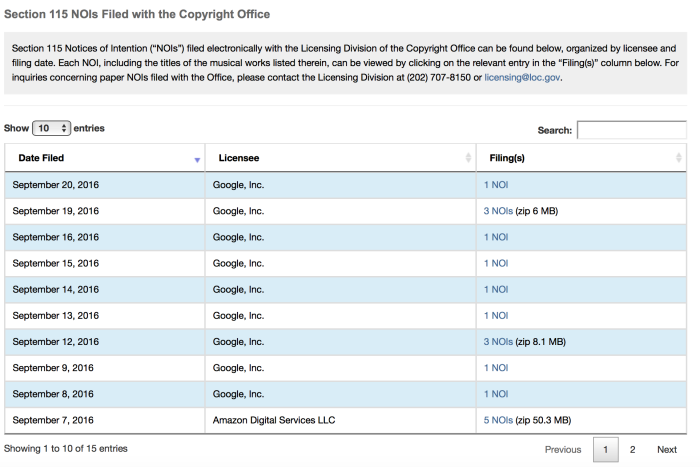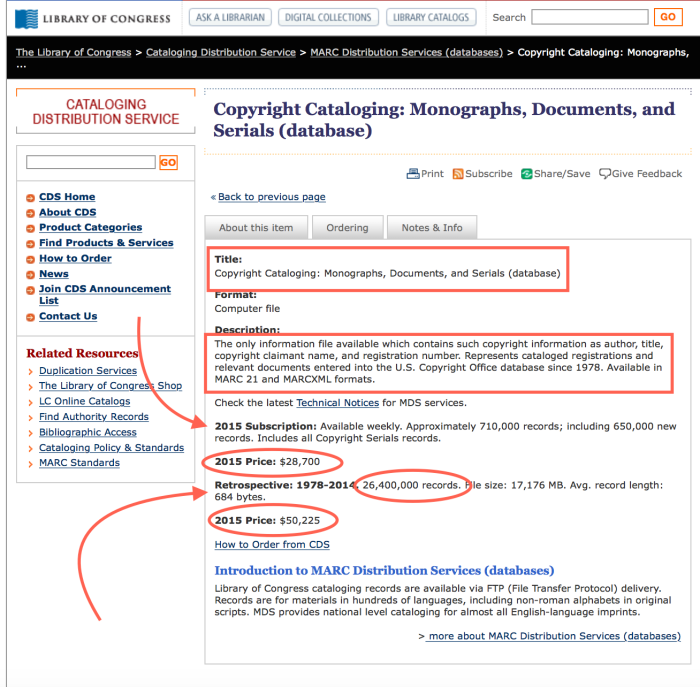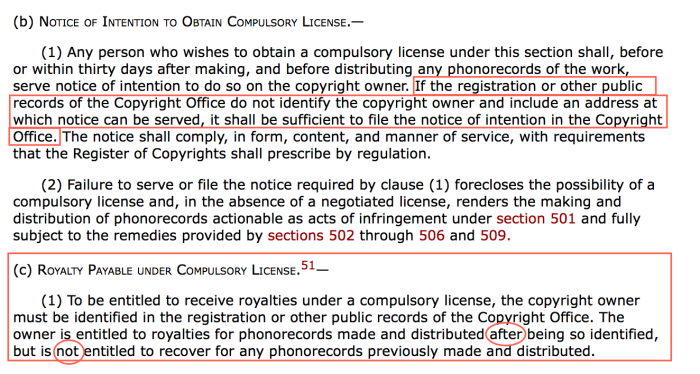
As noted in Part 1 of this post, Google, Amazon and others are filing what are reportedly “millions” of “address unknown” NOIs with the U.S. Copyright Office. I fully expect that Pandora will eventually do the same for its on-demand service and Spotify is likely to do the same. Note–this type of carpet bombing of NOIs would not have helped Spotify in the David Lowery litigation because David Lowery registered his copyrights that are the subject of that litigation.
If you click here, you will find the most recent iteration of these massive NOIs, which apparently are being posted on a regular basis. The screenshot above is the first page of these filings on the Copyright Office site, most of which came this month (September 2016).
Each Excel file can be downloaded–a word of warning, even the zipped files are large and may take a while to open on an average home computer.
Remember what you are looking at in these files–this is the list that results from comparing the list of sound recordings that the services are using to the data dump that the service purchases from the Library of Congress. Take a tip–you’ll never find the page on the LOC website unless you know where to look, which is right here.

Willful Blindness on Song Titles
This is an overwhelming amount of data, so in order to have any idea what is really going on, spot checking will be required. And since it’s Google, you know there’s a scam afoot, your challenge is just to figure out which scam it is this time. (Of course the entire exercise is a scam, but leave that to one side for now.)
Scam # 1 appears to be treating any song title that has any text in it other than the actual song title as a song for which the owner cannot be identified. Here’s two examples from Sting in the Google 9/16/16 NOI file:

Of course, the song “Fragile” is registered, but Google’s filing claims that there is a different song “Fragile (Live)” that is not registered by that title. Google has, no doubt, sent another NOI for the song “Fragile” (or has a direct license) and if so has actual knowledge of the song copyright owner.
And here’s the loophole–by claiming that “Fragile (Live)” is an “unknown” song, Google can try to get out of paying for the live version. (Because how would you know that “Fragile” performed by Sting for which you know the copyright owner is the same as “Fragile (Live)” performed by Sting for which you now claim to be shocked that is the same song–unless, oh, maybe if you listened to the two?) The government’s compulsory license says this:

If you search for live recordings in Google’s NOI filings, you will find many, many live recordings by artists such as Bob Dylan, Heart, Quincy Jones, Lynyrd Skynyrd and Chicago. And then there’s the medleys like “Hotel California Dreaming” which lists the Eagles writers with John and Michelle Phillips of the Mamas and the Papas.
Not to mention a ton of foreign songwriters who are under no obligation to register their songs with the U.S. Copyright Office.
Let’s also set aside for the moment whether the recordings that Google has listed on their certified filing are all lawfully distributed–some certainly look like bootlegs to me. Of course “bootlegs” these days have to include illegal live recordings posted on YouTube and then stream ripped into mp3 files to be distributed through Tunecore, CD Baby or someone else who doesn’t pay much attention to where the recordings come from and then subsequently distributed through Google–who invented the game.
So what appears to be happening is that Google and Amazon (which has hired MRI, I believe) are playing the willful blindness game. What can be done about it?
That will be the subject of the next and final part of this post.